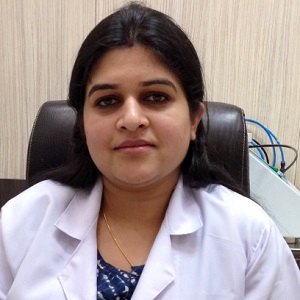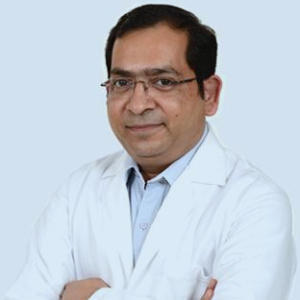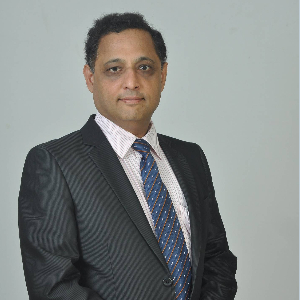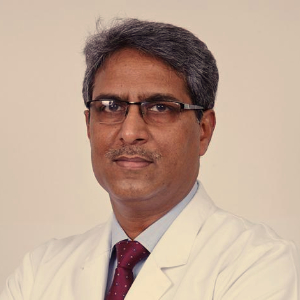Best Doctors in India for Alcoholic Hepatitis Treatment
- Dermatologist, Gurugram, New Delhi, India
- 20 years’ experience
- Artemis Hospital, Gurgaon
Profile Highlights:
- Dr. Pooja Aggarwal is a highly skilled Senior Consultant in Dermatology and Cosmetology at Artemis Hospitals, Gurugram.
- With an MBBS and MD in Dermatology, Leprosy, and Venereology, she brings a wealth of expertise in managing a wide range of skin, hair, and nail conditions.
- She is proficient in various procedures, including laser hair reduction, body contouring, PRP therapy, chemical peels, fractional lasers, and vitiligo surgeries. Her dedication to patient care is evident in her comprehensive approach, ensuring optimal outcomes for her patients.
- Gastroenterologist, Gurugram, India
- Over 18 years’ experience
Profile Highlights:
- Dr. Atul Sharma is a renowned Gastroenterology practitioner in Gurugram with a rich experience of more than 18 years in the field.
- He acquired Fellowship in Advanced interventional GI Endoscopy at BIDS, Mumbai.
- Dr. Atul Sharma is particularly interested in Third Space Endoscopy and Per Oral Endoscopic Myotomy (POEM).
- Presently, the doctor leads the Motility, IBD & Third Space Endoscopy Unit-II at the Artemis Hospital, Gurugram.
- Top Endocrinologist and Diabetologist | Apollo Hospital, New Delhi, India
- 26+ Years Experience
- Indraprastha Apollo Hospital, New Delhi
Profile Highlights:
- Dr. Mohammad Asim Siddiqui is a highly regarded Endocrinologist based in New Delhi, India. He has an experience of over 26 years in the field. Currently, he is associated with Indraprastha Apollo Hospital, New Delhi as a Consultant Endocrinologist.
- Dr. Siddiqui specializes in Internal Medicine & manages Diabetes, Endocrine and Metabolic Disorders.
- His interest in Diabetes mainly focuses on young and gestational diabetes & Post-transplant & post-metabolic surgery diabetes.
- Dr. Siddiqui is also involved in various clinical research and has penned more than 50 articles in national and international journals.
- Paediatric Cardiologist, Chennai, India
- Over 10 years’ experience
- Apollo Children Hospital Chennai
Profile Highlights:
- Dr. Muthukumaran C S is one of the finest Heart Specialists in India. He has successfully operated on more than 2500 cardiac catheterizations in children, 1000 AD closures, 250 VSD closures, and 700 PDA closures.
- The Medical practitioner has been associated with various reputed hospitals in India. Dr. Muthukumaran C S has been associated with many hospitals over the course of his illustrious and experienced career.
- IVF Specialist, Gynaecologist & Obstetrician; Mumbai, India
- Over 10 years’ experience
- Nova IVI Fertility Mumbai
Profile Highlights:
- Dr. Ritu Hinduja is a renowned Infertility expert in Mumbai with experience in the management of infertility and reproductive medicine and has training in all assisted reproduction techniques (ART).
- She holds a Masters degree in Reproductive Medicine and also has a Diploma in the same field from Keil University in Germany.
- Dr. Hinduja’s primary interest lies in the management of patients with fertility issues that include low ovarian reserve and preserving fertility for cancer patients and women who want to delay childbearing by freezing eggs.
- Top Neurologist | Apollo Hospital, New Delhi, India
- 26+ Years Experience
- Indraprastha Apollo Hospital, New Delhi
Profile Highlights:
- Dr. Anoop Kohli is one of the well-known Neurologists in India, having 26 years of clinical experience.
- He is interested in the treatment of Migraine, Brain Haemorrhage, Paralysis, Parkinson’s disease, Stroke, Paraplegia, Fits, and Meningitis.
- Dr. Kohli is currently a Senior Consultant Neurologist at Apollo Hospital, New Delhi, and a pioneer, who first devised an intravenous thrombolytic treatment and developed the first Trans-Cranial Doppler Lab of India at Apollo Hospitals, New Delhi.
- Dr. Anoop Kohli is also proficient in research. He has contributed 40 publications to various national and international journals.
- Top Neurosurgeon & Spine Surgeon | BLK Hospital, New Delhi, India
- 29+ Years Experience
- BLK Super Specialty Hospital, New Delhi
Profile Highlights:
- Dr. Anil Kumar Kansal is a highly respected and accomplished neurosurgeon with over 29 years of extensive experience in the field of neurosurgery, spine surgery, and robotic surgery.
- He currently serves as the Principal Director and Head of the Department at Max Healthcare, where he leads the Neurosciences division with a focus on delivering cutting-edge care to patients with complex neurological conditions.
- He earned his MCh in Neuro Surgery from King George’s Medical College, Lucknow University, in 2001, following an MS in General Surgery from the same prestigious institution in 1997.
- Cardio-vascular and Thoracic Surgery & Heart Transplant, Mumbai Maharashtra
- Over 30 years’ experience
- Reliance Hospital Navi Mumbai
Profile Highlights:
- Dr. Anvay Mulay is a renowned Consultant Cardio-thoracic Surgeon at Sir H. N. Reliance Foundation Hospital, specializing in advanced Cardiovascular, Thoracic Surgery, and Heart Transplant.
- With over 30 years of global experience, he has a distinguished track record in leading-edge cardiac care.
- Dr. Anvay Mulay has worked at Leeds General Infirmary, Providence St Vincent Hospital, and Bristol Royal Infirmary.
- He holds an MBBS and MS from Grant Medical College, Mumbai, an MCh from the University of Mumbai, and completed his fellowship at St. Vincent’s Hospital, Oregon.
- Plastic and Reconstructive Surgeon, Gurugram, India
- Over 10 years’ experience
- Fortis Memorial Research Institute
Profile Highlights:
- Dr. Amitabh Singh is a highly experienced plastic surgeon with a distinguished career spanning over a decade.
- He has garnered extensive expertise in various facets of plastic surgery through rigorous training and hands-on experience.
- Dr. Singh completed his MCh in Plastic Surgery and MS in General Surgery from Gujarat University, Ahmedabad, laying a strong foundation for his surgical practice.
- Dr. Singh further honed his skills in microvascular surgery through advanced training at renowned institutions, including Ganga Hospital in Coimbatore, Chang Gung Memorial Hospital in Taiwan, and Siriraj Hospital in Bangkok, Thailand.
- Top Obstetrician & Gynaecologist | Max Hospital, Saket, New Delhi, India
- 33+ Years Experience
- Max Super Specialty Hospital, Saket, New Delhi
Profile Highlights:
- Dr. Anuradha Kapur, Principal Director and Head of Unit in Obstetrics & Gynaecology at Max Healthcare, brings over 33 years of unparalleled expertise in her field.
- A product of Maulana Azad Medical College, Delhi, Dr. Kapur holds an MD and an MBBS from this esteemed institution.
- With a distinguished career dedicated to women’s health, Dr. Kapur is recognized for her exceptional skills in managing high-risk obstetrical and gynecological cases, a specialization honed through more than 30 years of post-MD experience.
Best Hospitals in India for Alcoholic Hepatitis Treatment
ALCOHOLIC HEPATITIS
Alcoholic hepatitis is a liver infection, which is mainly caused by frequent, heavy use of alcohol. Fat can build up in the liver cells, which might lead to inflammation as well as scarring of the liver.
Alcoholic hepatitis might be mild or severe. A patient might even need a liver transplant if proper treatment is not provided, or if they don’t stop consumption of alcohol.
It is also notable that all heavy drinkers don’t develop this condition, and sometimes this condition even develops in people who drink moderately. However, if you are diagnosed with this condition, it is important for you to quit drinking alcohol. People who continue drinking alcohol might face a huge risk of serious liver damage as well as death.
Symptoms
Depending on the amount of damage to the liver, the symptoms can vary. If you are having a mild form of the disease, you might not even experience any symptoms at all. However, as the damage continues to grow, you might experience the following:
- Changes in appetite
- Dry mouth
- Weight loss
- Pain or swelling in the abdomen
- Jaundice, or yellowing of the skin or eyes
- Fever
- Nausea and vomiting
- Easy bleeding or bruising
- Changes in your mental state, including confusion
- Fatigue
The symptoms of this condition are similar to those caused by a few other health conditions. Therefore, if you develop any of these symptoms, it is best to get a proper diagnosis as well as begin treatment.
Causes & risk factors
Alcoholic hepatitis generally develops when the alcohol you drink causes damage to your liver. However, it is not clear why alcohol does this damages only to some heavy drinkers.
Few factors that are known to play a role in this condition include:
- The body’s process that breaks down alcohol produces some toxic chemicals
- These chemicals can trigger inflammation that can destroy the liver cells
- Thus, over time, scars replace healthy liver tissue, thus interfering with the function of the liver
- This irreversible scarring, which is also termed cirrhosis, is the final stage of alcoholic liver disease
If you have hepatitis C and continue to drink, even moderately, you are more likely to develop cirrhosis.
Some heavy drinkers are also malnourished because they don’t eat a proper balanced diet. Alcohol and its byproducts also prevent the body from absorbing nutrition properly. Lack of nutrition can contribute to liver cell damage.
Some other risk factors that can lead to this condition include:
- Your sex- Women are usually at a higher risk of developing alcoholic hepatitis since the way alcohol is processed in women is different.
- Binge drinking- Having over five drinks within two hours for men and four or more for women can increase the risk of alcoholic hepatitis.
- Obesity- Heavy drinkers who are overweight are also more likely to develop alcoholic hepatitis and to progress from that condition to cirrhosis.
- Race and ethnicity- Hispanic and Negroid people might be at higher risk of alcoholic hepatitis.
- Genetic factors- According to studies, there may be a genetic component in alcohol-induced liver disease. However, it is difficult to separate genetic and environmental factors.
Diagnosis
If you are showing symptoms of alcoholic hepatitis, your doctor will first inquire about your medical history and alcohol consumption. Next, he/she will perform a physical exam to see if you have an enlarged liver or spleen. They might also need a few more tests to confirm your diagnosis, such as:
- Complete blood count (CBC)
- Liver function test
- Ultrasound of the liver
- Abdominal CT scan
- Blood clotting tests
In some cases, a liver biopsy might also be needed to confirm the diagnosis of alcoholic hepatitis. A liver biopsy requires your doctor to remove a tissue sample from your liver, which is then tested in the lab. This method helps to show the severity and type of liver disease.
Treatment
Stopping alcohol consumption is the most important treatment for alcoholic hepatitis. There is no cure for this condition, but treatment can help in reducing or eliminating symptoms, or stopping its progression.
It is also important to note that scarring of the liver is permanent, but treatment can aim to restore as much function as possible.
Dietary changes
Medication
Liver transplant
The best hope of recovery is to be aware of the signs and symptoms as well as to reduce, manage, or if possible, completely stop consumption of alcohol.
Complications
Alcoholic hepatitis might lead to severe other complications such as:
- Enlarged veins (varices)- In this condition, blood that is unable to flow freely through the portal vein, can back up into other blood vessels in your esophagus or stomach.
- Hepatic encephalopathy- This condition can be caused by the buildup of toxins if your damaged liver is unable to remove all the toxins from your body. It involves confusion, drowsiness, and slurred speech.
- Ascites- Ascites is a condition in which the fluid that accumulates in the abdomen may get infected and thus, require treatment with antibiotics. Although this condition is not life-threatening, it can be a sign of advanced alcoholic hepatitis, or cirrhosis.
- Kidney failure- A damaged liver affects blood flow to the kidneys, thus resulting in kidney failure.
- Cirrhosis- The scarring of the liver might lead to liver failure.
Prevention
Alcoholic hepatitis might be prevented if you take the following steps:
- Drink alcohol in moderation, if at all- For healthy adults, moderate drinking means no more than one drink a day for women of all ages and men older than 65, and not over two drinks a day for men aged 65 and younger. However, if you prevent all alcohol, it is a certain way to prevent this condition.
- Check before mixing medications and alcohol- Ask your doctor if it’s safe to drink alcohol while you are taking medications. Consider reading the warning labels on over-the-counter medications as well. Don’t drink alcohol when you are taking medications that warn of complications when combined with alcohol.
- Protect yourself from hepatitis C- Hepatitis C is an infectious liver disease that is caused by a virus. If it is left untreated, it may lead to cirrhosis. If you are having hepatitis C and you consume alcohol, you’re generally more likely to develop cirrhosis than if you don’t drink.















